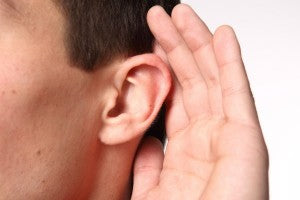Our ears are sensitive. They have to be in order to capture all the sound waves we use to explore our world. These sounds serve as entertainment, as part of communication, or as warnings of danger. Our brains create sound maps as well as spatial maps that help us make sense of our reality, but too much exposure to loud spikes in sound or continuous noise can damage these sensitive organs. As we age, many of us will also begin to lose our hearing as cells lose functionality or die.
 It may surprise many people that there are foods you can eat to help protect your ears, prevent hearing loss, and halt the progression of any loss that is already occurring. There are several minerals, vitamins, antioxidants, and nutrients that play a role in hearing and have been shown to help you keep listening to the world a little longer.
It may surprise many people that there are foods you can eat to help protect your ears, prevent hearing loss, and halt the progression of any loss that is already occurring. There are several minerals, vitamins, antioxidants, and nutrients that play a role in hearing and have been shown to help you keep listening to the world a little longer.
Alpha Lipoic Acid – Alpha lipoic acid is an enzyme facilitator and antioxidant that is created in small amounts in the body and comes in small amounts in the foods we eat. It defends hearing against free-radical damage, supports nerve system function, and helps generate mitochondria in the hair cells of the inner ear. It can be found in spinach, sweet potatoes, and broccoli.
Potassium – Potassium levels decrease as we age. The ear is particularly susceptible to this drop as potassium plays a large role in the way cells interact within the inner ear. Foods that contain potassium can help protect against age related hearing loss and may even help prevent noise related hearing loss. Foods rich in potassium include bananas, apricots, bananas, melons, oranges, and spinach.
Folate – Folate has been shown to lower the risk or slow the development of age related hearing loss. This B vitamin has long been known to help prevent birth defects, but it is important to health throughout your lifetime. Folate is water soluble and not stored well in the body, so you must get your daily dose from food. Look for broccoli, asparagus, spinach and other leafy greens, lentils, beans, and avocado.
Vitamin C and E – These two vitamins both act as  antioxidants to protect cells from free radical damage. Vitamin E revitalizes blood vessels and nerves around the ear while vitamin C boosts immune function to resist ear infections. Vitamin C can be found in citrus fruits, fresh herbs, guava, and strawberries. Vitamin E comes in almonds, sunflower seeds, leafy greens, mango, and olive oil. For the power of both vitamins together pick up red bell peppers, broccoli, kiwi, and papaya.
antioxidants to protect cells from free radical damage. Vitamin E revitalizes blood vessels and nerves around the ear while vitamin C boosts immune function to resist ear infections. Vitamin C can be found in citrus fruits, fresh herbs, guava, and strawberries. Vitamin E comes in almonds, sunflower seeds, leafy greens, mango, and olive oil. For the power of both vitamins together pick up red bell peppers, broccoli, kiwi, and papaya.
Vitamin D – This vitamin is found naturally in very few foods, but is important in many aspects of health, ranging from weight control to bone formation. It has more recently taken the stage as aiding in the prevention of hearing loss. Vitamin D has anti-inflammatory properties and strengthens the tiny bones in the ear. Get vitamin D from sunlight, mushrooms, microalgae, and lichens. It only takes a few minutes each day in the sun to supply all you need.
Omega 3 Fatty Acids – Omega 3s are the healthy fats found in many seeds, grains, beans, and oils. These fats reduce inflammation that can damage sensitive tissues and have beneficial effects on the cardiovascular system. They have also been linked to the prevention of age related hearing loss. Omega 3 rich foods include chia seeds, flaxseed, walnuts, beans, olive oil, sacha inchi oil, coconut oil, and purslane.
Magnesium – Magnesium is a part of thousands of functions in the body. This mineral helps us deal with stress and has been shown to help ease hearing sensitivities, reduce tinnitus, and prevent hearing loss.  There are many foods rich in magnesium. These include almonds, brown rice, leafy greens, artichokes, barley, Brazil nuts, beans, and pumpkin seeds.
There are many foods rich in magnesium. These include almonds, brown rice, leafy greens, artichokes, barley, Brazil nuts, beans, and pumpkin seeds.
Vitamin B12 – A deficiency in B12 can result in hearing loss. For vegans and vegetarians, this vitamin is more difficult to find in food since it comes into the human diet primarily from animal products that have been contaminated by bacteria. It can be also be found in small amounts on organic produce and is created in the intestines by friendly bacteria. There are also a couple cleaner foods that can be leaned on for more B12, namely nori, an edible seaweed, and spirulina, a blue-green algae, but supplementation may be necessary.





